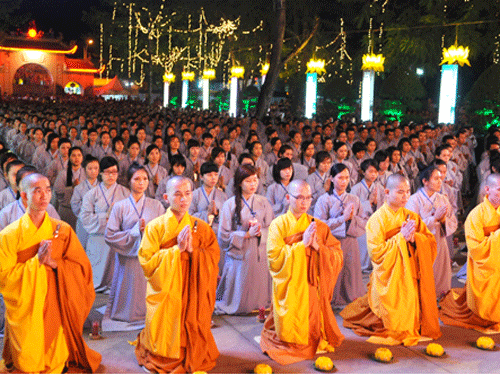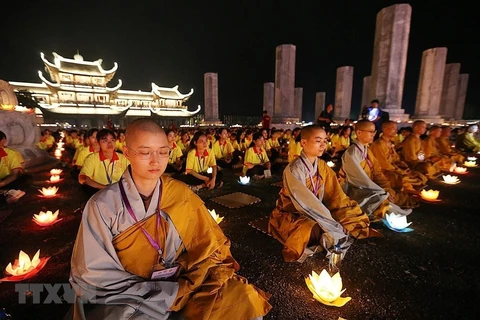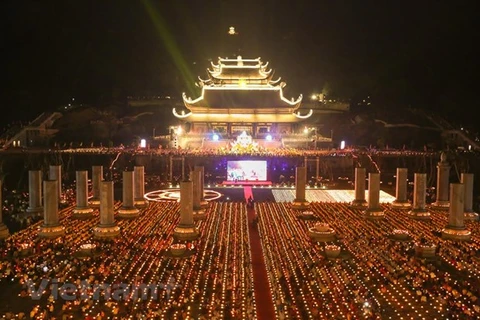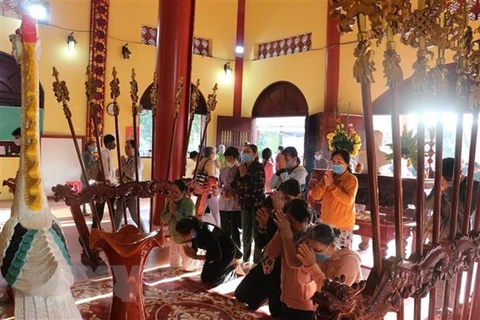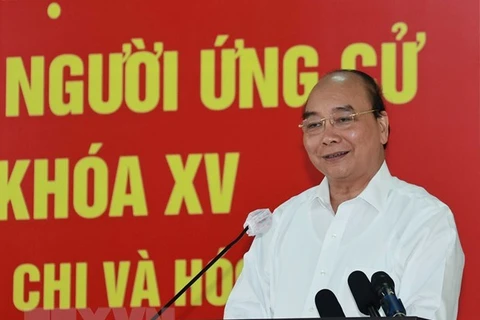Hanoi (VNA) – Throughout the “Doi moi” (Renewal) process, the belief and religious life in Vietnam has changed towards greater freedom and progress, with belief and religious activities taking place vibrantly, and the right to belief and religious freedom better protected, which has been recognised by the international community.
Vietnam is now home to 16 religions that have been recognised by the State, including Buddhism, Catholicism, Protestantism, Caodaism, Hoa Hao Buddism, Muslim, Baha’I Faith, Tinh do Cu sy Phat hoi, Seventh-day Adventist, Tu An Hieu Nghia Buddhism, Minh Su dao, Minh Ly dao – Tam Tong Mieu, Brahmanism, Mormonism, Hieu Nghia Ta Lon Buddhism, and Buu Son Ky Huong Faith.
The country has 43 religious organisations with 26.5 million followers, accounting for 28 percent of the country’s population, along with tens of thousands of religious and worship facilities.
Together with diversity in religions, Vietnam is also a nation with 54 ethnic groups, with ethnic minority groups being considered as an important part of the Vietnamese ethnic community.
With a consistent stance, all policies and orientations of by the Party and policies and laws of the State have aimed to serve the people, ensuring that all ethnic minority groups enjoy the right to belief and religious freedom like their fellows from other ethnic groups.
For a multi-ethnic and multi-religion country, belief and religious activities have been practiced vibrantly across the country, creating a diversity in Vietnamese people’s spiritual life. Currently, about 95 percent of Vietnamese people have practiced belief and religious activities.
Religious organisations have been allowed to set up their own training facilities and training courses. So far, there have been 63 religious training facilities belonging to Buddhism, Catholicism, Protestantism, Caodaism and Hoa Hao Buddhism, with nearly 20,000 trainees each year. In 2020, about 230 new worship facilities were built, while 308 others were upgraded and repaired.
In the 2017-2020 period, three religious organisations were granted with operation registration certificates, namely the Vietnam United Gospel Outreach Church, the Vietnam Full Gospel Church, and the Church of Jesus Christ of Latter-day Saints, while one religious organisation - the Assemblies of God of Vietnam - was legally recognised.
Since the Law on Belief and Religion took effect, international cooperation activities of religious organisations and individuals have been expanded at different levels and scales. Many large-scale international activities have been hosted by Vietnamese religious organisations, including the UN Vesak Day 2019 and the General Chapter of the Preachers Order in 2019.
Members of many religious organisations and individuals have traveled abroad to join religious training courses and conferences as well as exchange and cooperation activities.
Religious activities carried out by foreign organisations and individuals in Vietnam have enjoyed favourable conditions, including easy procedures for the registeration of concentrated religious activities and inviting foreign or Vietnamese religious dignitaries to preaching, as well as allowing the import of religious cultural products to Vietnam.
New features in the Law of Belief and Religion have reformed and simplified administrative procedures, making it easier for belief and religious activities. For example, the necessary operation duration for a religious organisation to be recognised has been shortened from 23 years to five years.
These have been the strongest affirmation of Vietnam in protecting human rights, including the right to belief and religious freedom. The rights are prescribed in the Constitution 2013, the Law on Belief and Religion 2016 and the Government’s Decree No. 162/2017/ND-CP, thus creating a firm legal foundation for the better ensuring of the right to belief and religious freedom./.
Vietnam is now home to 16 religions that have been recognised by the State, including Buddhism, Catholicism, Protestantism, Caodaism, Hoa Hao Buddism, Muslim, Baha’I Faith, Tinh do Cu sy Phat hoi, Seventh-day Adventist, Tu An Hieu Nghia Buddhism, Minh Su dao, Minh Ly dao – Tam Tong Mieu, Brahmanism, Mormonism, Hieu Nghia Ta Lon Buddhism, and Buu Son Ky Huong Faith.
The country has 43 religious organisations with 26.5 million followers, accounting for 28 percent of the country’s population, along with tens of thousands of religious and worship facilities.
Together with diversity in religions, Vietnam is also a nation with 54 ethnic groups, with ethnic minority groups being considered as an important part of the Vietnamese ethnic community.
With a consistent stance, all policies and orientations of by the Party and policies and laws of the State have aimed to serve the people, ensuring that all ethnic minority groups enjoy the right to belief and religious freedom like their fellows from other ethnic groups.
For a multi-ethnic and multi-religion country, belief and religious activities have been practiced vibrantly across the country, creating a diversity in Vietnamese people’s spiritual life. Currently, about 95 percent of Vietnamese people have practiced belief and religious activities.
Religious organisations have been allowed to set up their own training facilities and training courses. So far, there have been 63 religious training facilities belonging to Buddhism, Catholicism, Protestantism, Caodaism and Hoa Hao Buddhism, with nearly 20,000 trainees each year. In 2020, about 230 new worship facilities were built, while 308 others were upgraded and repaired.
In the 2017-2020 period, three religious organisations were granted with operation registration certificates, namely the Vietnam United Gospel Outreach Church, the Vietnam Full Gospel Church, and the Church of Jesus Christ of Latter-day Saints, while one religious organisation - the Assemblies of God of Vietnam - was legally recognised.
Since the Law on Belief and Religion took effect, international cooperation activities of religious organisations and individuals have been expanded at different levels and scales. Many large-scale international activities have been hosted by Vietnamese religious organisations, including the UN Vesak Day 2019 and the General Chapter of the Preachers Order in 2019.
Members of many religious organisations and individuals have traveled abroad to join religious training courses and conferences as well as exchange and cooperation activities.
Religious activities carried out by foreign organisations and individuals in Vietnam have enjoyed favourable conditions, including easy procedures for the registeration of concentrated religious activities and inviting foreign or Vietnamese religious dignitaries to preaching, as well as allowing the import of religious cultural products to Vietnam.
New features in the Law of Belief and Religion have reformed and simplified administrative procedures, making it easier for belief and religious activities. For example, the necessary operation duration for a religious organisation to be recognised has been shortened from 23 years to five years.
These have been the strongest affirmation of Vietnam in protecting human rights, including the right to belief and religious freedom. The rights are prescribed in the Constitution 2013, the Law on Belief and Religion 2016 and the Government’s Decree No. 162/2017/ND-CP, thus creating a firm legal foundation for the better ensuring of the right to belief and religious freedom./.
VNA

